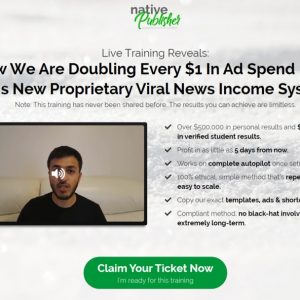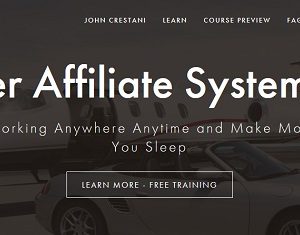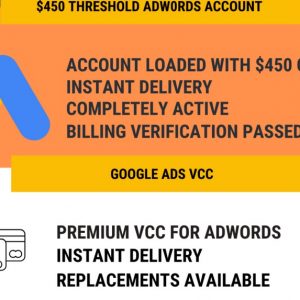[GroupBuy] Info Product Agency – Ben Bader
$997.00 Original price was: $997.00.$29.00Current price is: $29.00.
The rise of the Info Product Agency model has sparked significant interest, promising lucrative opportunities for entrepreneurs and seasoned professionals alike. One program, the Artisan Lab, spearheaded by Ben Bader and operating under Hoopr Media LLC, claims to offer a blueprint for achieving substantial financial success in this domain. This article delves into the intricacies of Artisan Lab, its curriculum, target audience, marketing strategies, and the underlying mechanics that drive its purported success, providing a comprehensive analysis of its value proposition.
Table of Contents
Info Product Agency
The information product market has exploded. It’s not just books or online courses anymore; it’s a complete ecosystem of coaching, consulting, and digital assets promising transformation. Amidst this surge, the Info Product Agency is born – a entity specializing in creating, marketing, and scaling these informational commodities. The allure of high margins and the scalability of digital products make this a compelling business venture. The question remains: how do you navigate this complex landscape and build a successful Info Product Agency?
The Allure and Challenges of the Creator Economy
The Creator Economy has democratized content creation and distribution, allowing individuals to monetize their expertise directly. This presents a wealth of opportunities for developing and selling info-products. However, this democratization also brings intense competition. Standing out from the noise requires more than just knowledge; it demands strategic marketing, compelling content, and a robust sales funnel. Many aspiring entrepreneurs underestimate the complexities involved in building a sustainable business in this ecosystem.
Success in the creator economy requires wearing multiple hats. You need to be a subject matter expert, a content creator, a marketer, and a salesperson. This can be overwhelming, especially for beginners. The Info Product Agency, therefore, aims to provide a structured pathway through this chaos, offering guidance and frameworks for each critical area. However, the effectiveness of such agencies depends heavily on the quality of their curriculum, the expertise of their coaches, and the support system they provide.
The Artisan Lab positions itself as a solution to these challenges. Its emphasis on key skills like copywriting, funnel building, and client acquisition suggests a comprehensive approach to building an Info Product Agency. The program’s focus on scaling to $20k per month further indicates an ambition beyond mere survival in the creator economy. The testimonies of students are supposed to give proof to the claim too.
Decoding the Artisan Lab Curriculum: Six Pillars of Success
Artisan Lab’s curriculum is built around what it claims as six core competencies crucial for building and scaling an Info Product Agency. Let’s analyse each of these components and their significance:
- Copywriting
- Funnel Building
- Script Writing
- Client Acquisition
- Content Creation
- Scaling
These skills are undeniably fundamental to any digital marketing venture. However, what distinguishes a truly effective program is the depth and practical application of its teachings. For example, copywriting isn’t just about writing catchy headlines; it’s about understanding your audience, crafting compelling narratives, and driving conversions. Funnel building involves more than just designing a sequence of pages; it requires optimizing user experience, tracking key metrics, and continuously iterating based on data.
A critical evaluation of Artisan Lab’s effectiveness hinges on how these skills are taught and how readily applicable they are to real-world scenarios. The program’s marketing highlights student success stories, but it’s crucial to consider the context behind these achievements. What specific strategies were employed? How much time and effort did they require? What were the challenges faced and how were they overcome? A deeper understanding of these factors is essential for accurately assessing the program’s value.
Target Audience: From Aspiring Entrepreneurs to Burnt-Out Agency Owners
Artisan Lab targets a diverse audience, ranging from individuals with no prior experience to established professionals seeking a new direction. This broad appeal can be both a strength and a weakness. On one hand, it expands the potential customer base. On the other hand, it necessitates a curriculum that can cater to varying levels of knowledge and experience. A program that is too basic may not be challenging enough for experienced agency owners, while one that is too advanced may overwhelm beginners.
The program’s marketing specifically targets individuals feeling “burnt out” in their current roles, such as those working in social media marketing agencies (SMMAs) or traditional 9-to-5 jobs. This messaging resonates with a common desire for greater autonomy, flexibility, and financial reward. The promise of building a specialized Info Product Agency tapping into the creator economy’s potential is particularly alluring to those seeking a more fulfilling and impactful career path. The question is whether Artisan Lab can live up to that promise for such a diverse group of individuals with vastly different backgrounds and expectations.
Consider Ben Bader’s intentions behind targeting such a broad audience. Is it simply a matter of maximizing reach, or is there a genuine belief that the program can provide value to everyone, regardless of their starting point? Understanding the motivations behind the target audience selection is crucial for evaluating the program’s ethical considerations and potential for long-term success.
Ben Bader
Ben Bader, the figurehead behind Artisan Lab and Hoopr Media LLC, is a key element in the program’s brand. His expertise, leadership, and vision shape the entire enterprise. He is more than just a program creator; he is the mentor, the guide, and the symbol of what participants could potentially achieve.
The Role of Student Testimonials and Social Proof
Artisan Lab’s marketing strategy heavily relies on student testimonials, showcasing rapid and significant financial successes. This is a common tactic in the online coaching and education space, leveraging the power of social proof to build trust and credibility. However, it’s essential to approach these testimonials with a critical eye, considering potential biases and limitations.
The authenticity and representativeness of testimonials are crucial factors to consider. Are the featured students typical of the overall participant pool, or are they exceptional cases? Have these testimonials been independently verified, or are they solely based on self-reported data? What is the time frame between the student’s participation in the program and their reported success? These questions can help to assess the reliability and validity of the claims made in the testimonials.
The program also emphasizes transitions from less desirable career paths, such as corporate jobs or burnt-out agency ownership. This narrative aligns with a common aspiration for greater freedom and control over one’s work life. However, it’s important to recognize that success in the independent info-product space requires significant dedication, resilience, and adaptability. While Artisan Lab may provide a framework and guidance, individual effort and commitment remain critical determinants of outcome.
It’s also vital to remember that success stories, while inspiring, don’t guarantee similar results for everyone. Each individual has unique circumstances, skill sets, and resources. The Info Product Agency model, like any business venture, carries inherent risks and uncertainties. A thorough assessment of one’s own capabilities and resources, along with a realistic expectation of the challenges involved, is essential before investing in any program or coaching service.
Examining the Marketing and Lead Generation Strategy
Artisan Lab employs a multi-faceted marketing and lead generation strategy, leveraging online channels to attract potential participants. The emphasis on lead capture forms and SMS marketing highlights a data-driven approach, aiming to build a targeted audience and nurture them through the sales funnel. However, ethical considerations and compliance with privacy regulations are paramount in these practices.
The website’s use of a lead capture form, prompting visitors to “Enter your info to learn how to scale their business,” is a common practice. However, the transparency of data usage and the clarity of consent are critical factors. Users should be fully informed about how their information will be used and have the ability to opt out at any time. The promise that “Your Information Is 100% Secure and Will Not Be Shared With Anyone” should be strictly adhered to, building trust and maintaining ethical standards.
The use of SMS marketing, with a stated frequency of up to 10 messages per month, requires explicit consent and a readily available opt-out mechanism. While SMS marketing can be an effective communication tool, it can also be perceived as intrusive if not handled carefully. The clarity of the messaging, the relevance of the content, and the ease of opting out are essential for ensuring a positive user experience.
The program’s primary call to action, “Apply For Coaching” or “Apply Here”, encourages prospective applicants to take the next step in the sales funnel. The mandatory video requirement before applying suggests a screening process, aiming to qualify leads and ensure that applicants are serious about the program. This is a common practice in high-value coaching programs, allowing the program to focus its resources on individuals who are most likely to benefit from the curriculum.
Hoopr Media LLC: The Operating Entity and Its Implications
The involvement of Hoopr Media LLC as the operating entity raises important questions about the legal and financial structure of Artisan Lab. Understanding the company’s history, ownership, and financial performance can provide valuable insights into the program’s stability and credibility.
The legal disclaimers on the website, stating that it is not part of YouTube, Google, or Facebook and is not endorsed by these companies, are standard practices to avoid trademark infringement and potential legal issues. These disclaimers highlight the importance of operating within legal and ethical boundaries in the online space. However, they also raise the question of how Artisan Lab leverages these platforms for marketing and lead generation without direct endorsement or affiliation.
The statement that Hoopr Media LLC “holds all rights reserved” underscores the company’s ownership of the program’s intellectual property, including the curriculum, branding, and marketing materials. This is a common practice in the business world, protecting the company’s assets and preventing unauthorized use or reproduction. However, it also raises the question of how participants can use the knowledge and skills gained in the program to build their own Info Product Agencies without infringing on Hoopr Media LLC’s intellectual property rights.
Further investigation into Hoopr Media LLC’s background and track record could shed light on the company’s expertise in the info-product space and its ability to deliver on its promises. This could involve researching the company’s leadership team, reviewing its online presence, and examining any available financial data. A more comprehensive understanding of the operating entity can help potential participants make informed decisions about the program’s value and suitability.
Conclusion
Artisan Lab, under the guidance of Ben Bader and operated by Hoopr Media LLC, presents itself as a viable pathway for aspiring entrepreneurs and seasoned professionals to establish and scale Info Product Agencies. The program emphasizes key skills like copywriting and client acquisition, leveraging student testimonials to demonstrate potential success. The program’s marketing strategy which relies upon student testimonials is implemented to build trust and credibility. However, it is important to approach data objectively – a deep investigation of the legitimacy of student testimonials is vital to assess the program’s usefulness and value. Evaluating the curriculum’s depth, the representativeness of the students, and the transparency of marketing practices is crucial before investing.
Sales Page:_https://go.benbader.com/the-artisan-lab
Delivery time: 12 -24hrs after paid
Be the first to review “[GroupBuy] Info Product Agency – Ben Bader” Cancel reply
Related products
Marketing












Reviews
There are no reviews yet.